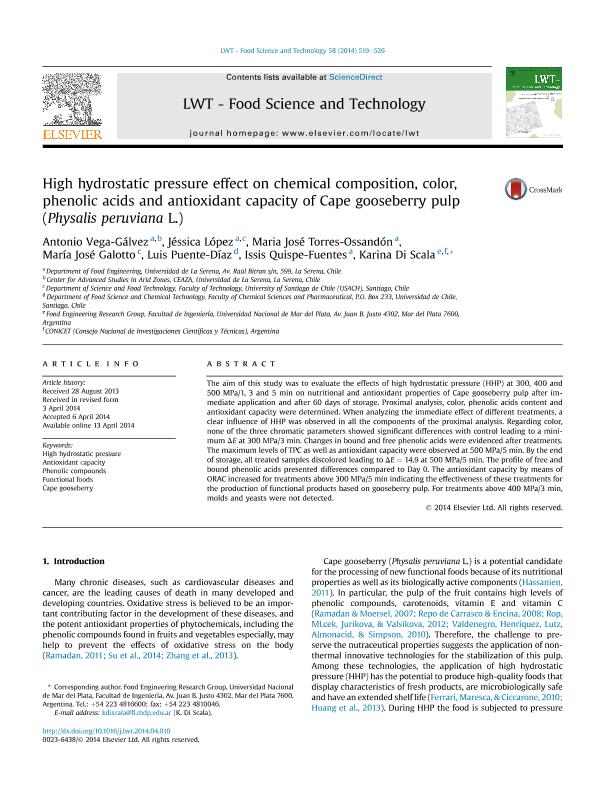Mostrar el registro sencillo del ítem
dc.contributor.author
Vega Gálvez, Antonio
dc.contributor.author
López, Jessica
dc.contributor.author
Torres Osandón, Maria José
dc.contributor.author
Galotto, Maria José
dc.contributor.author
Puente Díaz, Luis
dc.contributor.author
Quispe Fuentes, Issis
dc.contributor.author
Di Scala, Karina Cecilia

dc.date.available
2018-01-25T17:43:45Z
dc.date.issued
2014-04
dc.identifier.citation
Vega Gálvez, Antonio; López, Jessica; Torres Osandón, Maria José; Galotto, Maria José; Puente Díaz, Luis; et al.; High hydrostatic pressure effect on chemical composition, color, phenolic acids and antioxidant capacity of Cape gooseberry pulp (Physalis peruviana L.); Elsevier Science; LWT - Food Science and Technology; 58; 2; 4-2014; 519-526
dc.identifier.issn
0023-6438
dc.identifier.uri
http://hdl.handle.net/11336/34605
dc.description.abstract
The aim of this study was to evaluate the effects of high hydrostatic pressure (HHP) at 300, 400 and 500 MPa/1, 3 and 5 min on nutritional and antioxidant properties of Cape gooseberry pulp after immediate application and after 60 days of storage. Proximal analysis, color, phenolic acids content and antioxidant capacity were determined. When analyzing the immediate effect of different treatments, a clear influence of HHP was observed in all the components of the proximal analysis. Regarding color, none of the three chromatic parameters showed significant differences with control leading to a minimum ΔE at 300 MPa/3 min. Changes in bound and free phenolic acids were evidenced after treatments. The maximum levels of TPC as well as antioxidant capacity were observed at 500 MPa/5 min. By the end of storage, all treated samples discolored leading to ΔE = 14.9 at 500 MPa/5 min. The profile of free and bound phenolic acids presented differences compared to Day 0. The antioxidant capacity by means of ORAC increased for treatments above 300 MPa/5 min indicating the effectiveness of these treatments for the production of functional products based on gooseberry pulp. For treatments above 400 MPa/3 min, molds and yeasts were not detected.
dc.format
application/pdf
dc.language.iso
eng
dc.publisher
Elsevier Science

dc.rights
info:eu-repo/semantics/openAccess
dc.rights.uri
https://creativecommons.org/licenses/by-nc-nd/2.5/ar/
dc.subject
High Hydrostatic Pressure
dc.subject
Antioxidant Capacity
dc.subject
Phenolic Compounds
dc.subject
Functional Foods
dc.subject
Cape Gooseberry
dc.subject.classification
Alimentos y Bebidas

dc.subject.classification
Otras Ingenierías y Tecnologías

dc.subject.classification
INGENIERÍAS Y TECNOLOGÍAS

dc.title
High hydrostatic pressure effect on chemical composition, color, phenolic acids and antioxidant capacity of Cape gooseberry pulp (Physalis peruviana L.)
dc.type
info:eu-repo/semantics/article
dc.type
info:ar-repo/semantics/artículo
dc.type
info:eu-repo/semantics/publishedVersion
dc.date.updated
2018-01-24T14:51:38Z
dc.journal.volume
58
dc.journal.number
2
dc.journal.pagination
519-526
dc.journal.pais
Países Bajos

dc.journal.ciudad
Amsterdam
dc.description.fil
Fil: Vega Gálvez, Antonio. Universidad de la Serena; Chile
dc.description.fil
Fil: López, Jessica. Universidad de la Serena; Chile. Universidad de Santiago de Chile; Chile
dc.description.fil
Fil: Torres Osandón, Maria José. Universidad de la Serena; Chile
dc.description.fil
Fil: Galotto, Maria José. Universidad de Santiago de Chile; Chile
dc.description.fil
Fil: Puente Díaz, Luis. Universidad de la Serena; Chile
dc.description.fil
Fil: Quispe Fuentes, Issis. Universidad de la Serena; Chile
dc.description.fil
Fil: Di Scala, Karina Cecilia. Consejo Nacional de Investigaciones Científicas y Técnicas; Argentina. Universidad Nacional de Mar del Plata. Facultad de Ingeniería; Argentina
dc.journal.title
LWT - Food Science and Technology

dc.relation.alternativeid
info:eu-repo/semantics/altIdentifier/doi/http://dx.doi.org/10.1016/j.lwt.2014.04.010
dc.relation.alternativeid
info:eu-repo/semantics/altIdentifier/url/https://www.sciencedirect.com/science/article/pii/S0023643814002035
Archivos asociados
